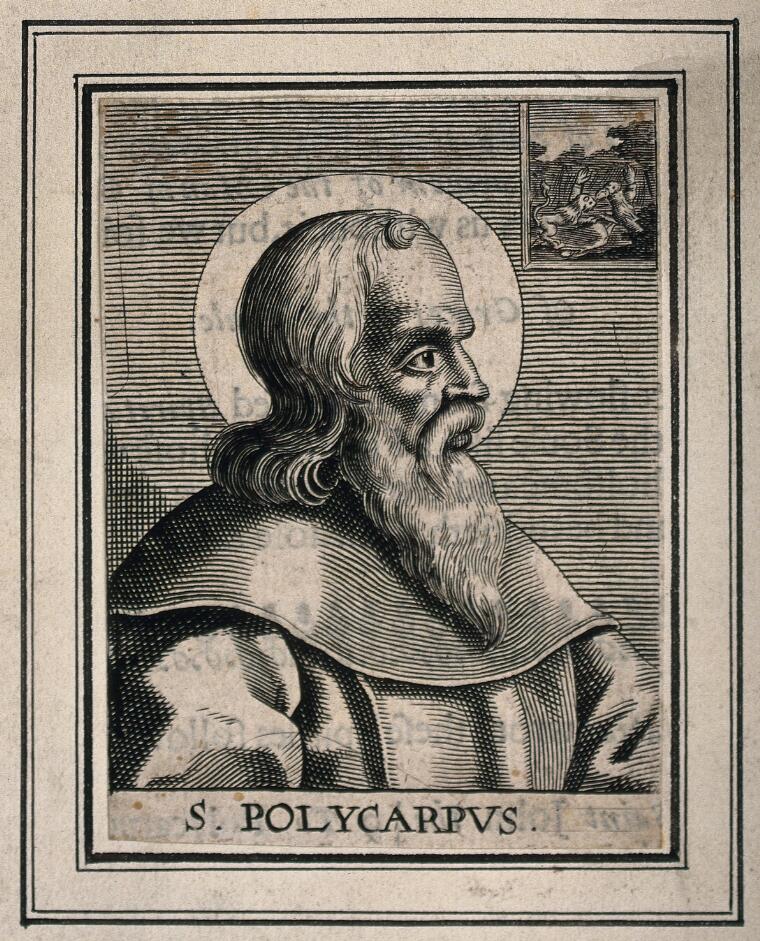Feast Day: February 23
Polycarp knew St. John the Apostle. He is the final person of whom we confidently can say, “this man received the Gospel directly from Jesus’ chosen Twelve.” He in turn passed on their words of hope to his flock and to other bishops (most famously Irenaeus), and so the Tradition of the Church continues down to us in an unbroken chain of living faith two thousand years later.
I like St. Polycarp in part because I feel those lovely, deep roots of Catholicism when I contemplate him. I love him too for his holy simplicity. His is not the kind of simplicity that’s a synonym for shallowness or stupidity; his is the kind of simplicity that cuts straight to the core. Polycarp’s simple faith led him to a martyr’s death around 155 or 165 A.D. His sacrifice offers us a chance to find our footing as we each embark on our six-week journey of Lenten sacrifice and spiritual growth.

St. Polycarp in Life and Death
We know little of Polycarp’s early life. He probably hailed from modern-day Turkey, then part of the Roman Empire and where St. John spent his last years. He became bishop of Smyrna (modern Izmir). He comes across in our fragmentary evidence as a man of compassion and discernment. When he discovered that Romans had a different way of fasting during Lent than him, he shrugged and said he would do what he had learned from John but others could do as they liked so long as they did something. In contrast, he quickly condemned the danger when key truths of salvation came into question (including some groups that said Christ never took on human flesh and others who rejected the Old Testament as the lies of a vindictive God whom Christ had come to overthrow). Keep your distance from those groups, he advised, but let priests be ready to welcome back those who have wandered.
Only one piece of writing from his pen survives: a letter to the Philippians. His message was simple and wholesome. Trust God and Christ’s sacrifice. Love others as Jesus loved people and forsake the love of money (a point he repeats multiple times). Be patient and put your hope in heaven. Poignantly, given his own end, Polycarp began his letter by praising the community for its aid to brothers and sisters in chains for their faith and he concluded it with an exhortation to obey the political authorities and to pray for them even as Jesus told us to pray for our persecutors.
Roman persecution of Christians in that time would burst out erratically and then simmer down for years. The Roman officials only caught up with Polycarp when he was an old man. After torturing a Christian slave for information, they found the bishop on an outlying farm. Polycarp greeted the soldiers politely at the door and had them served dinner while he spent an hour in prayer. After a short trial, the judge sentenced him to be burned alive. Polycarp walked calmly up to the stake and put his hands behind it. When the executioner lit the fire, the flames seemed to dance around Polycarp. A sweet scent like incense rather than the stench of burnt flesh filled the air. Finally the executioner drew his sword and stabbed the old bishop through the heart.

Gratitude as the Foundation of Polycarp’s Sacrifice
The report of how Polycarp died comes from a letter written by members of his community who had witnessed his death themselves. At least that is what the text claims to be—many historians accept that claim while others think it was written later. However, even those who argue for later date acknowledge that the people who wrote it lived in the time of Roman persecution. The looming threat of execution belonged to their reality, not some heroic past. How did they face it?
There are so many Christians who courageously died as martyrs that it is sometimes easy to forget how many found that too hard. The Martyrdom of Polycarp includes at its beginning a caution: the story of a man named Quintus who, intending to achieve martyrdom, sought out a confrontation with the authorities. Then, confronted with the reality of being devoured by beasts in the arena, he caved. He sacrificed to the pagan gods and abandoned his faith to save his life.
Avoiding martyrdom would have been easy. When Polycarp faced the judge, all he had to do was toss a little pinch of incense into the fire in front of an image of the emperor as an offering to Caesar’s “genius” or spirit. It was just a little, easy action expected of all patriotic citizens. Do that and you lived. Refuse, and you died in a public, humiliating, torturous way.
Polycarp’s response: “For eighty-six years I have served Him and he has never done me wrong. How then can I blaspheme my King who saved me?”
Gratitude. Polycarp had simple, certain courage because he could recognize the daily evidence of God’s wonderful love in his own life and its growth from year to year. The little graces and thankful recognition of God’s help accumulated through the years into a vast bank of faith from which he could withdraw this final act of hope. That hope ultimately rested in God’s greatest gift to Polycarp: that God came in flesh out of love and suffered to open eternal happiness to him.
Given all of God’s goodness—that Polycarp had done nothing to deserve—the only logical, loving response that Polycarp could make was to be open to giving something for his Father above in return. And so he gratefully offered up his last little time on Earth and awaited the best of gifts from God: Heaven.
“I thank Thee that Thou hast deemed me worthy of this day and hour, that I should have my portion in the number of the martyrs, in the cup of thy Christ, unto the resurrection of eternal life, both of the soul and body… On this account, and concerning all things, I praise Thee, I bless Thee, I glorify Thee…”
Polycarp’s prayer at his execution, Martyrdom of Polycarp 14, translation by Charles Hoole (1885)
A Prayer of Gratitude for Beginning my Lent

Father, I pray to you and give you thanks because you have given me so many wonderful things and graces. I have done nothing to deserve the loving parents you gave me, the chance to be raised knowing you, the comforts of this prosperous nation, or the beauty of the birds, trees, and hills with which you delight me. I certainly never deserved the gift of your Son. Thank you so much for it all.
Thank you too for the graces you have given me as I’ve tried to grow and serve those around me. For the career opportunities, for my education, for loving and being loved, for the wise people from whom I’ve learned faith, thank you, my Lord.
Lord, I know that I’ve rejected and misused your gifts and graces. I’m sorry for it. I’m not the person yet that You or I know I could eventually be. Lord, I do want to become that person. I want to be holy as You are holy. Help me this Lent to embrace sacrifice and service to others. I know I can never repay You, but I want to give something back and I want to grow. May my self-denial, alms, and prayer this Lent focus me more on Your love. May I one day find myself with You in Heaven.
Through the intercession of St. Polycarp. Amen.
If you have a response, thoughts, or questions, please comment at the bottom of the page! If you enjoy these posts, consider subscribing to get weekly notifications by email.



1 Response
[…] you missed them, check out the earlier Lenten posts on sacrifice/fasting with Polycarp and almsgiving with St. Katharine […]